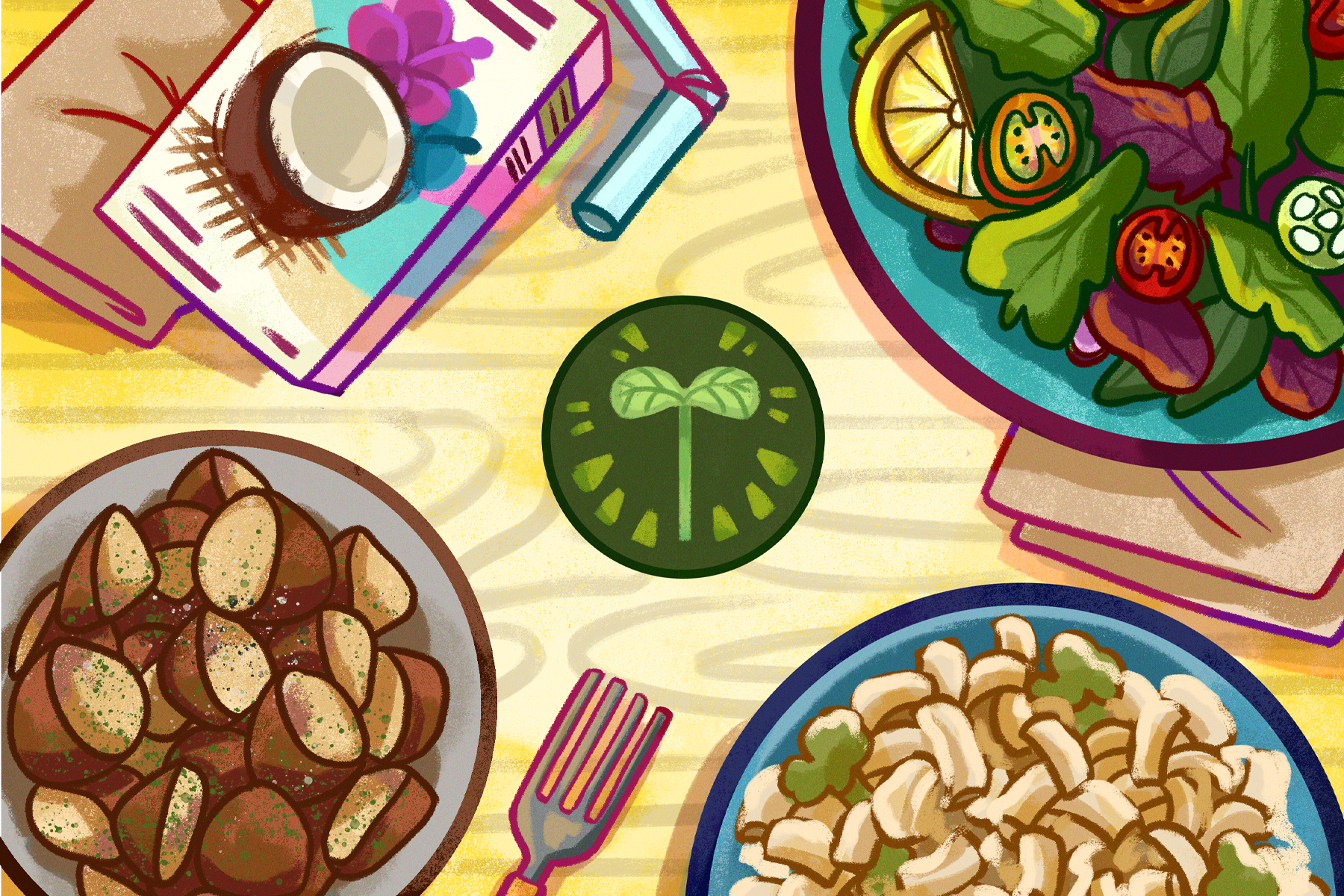When it comes to satisfying one’s cravings on campus, the first trip is usually the dining hall. They provide a comfortable space for college students while also supplying inviting food — but not all students can accept the invitation. Students with allergies or strict diets don’t have as many food options as their peers. Numerous colleges have begun supplying additional menu items to students with food allergies and special dietary needs; however, even with these additions, the options are still quite limited. Students living on campus have to find other means for obtaining nutrition rather than using the meal credits already paid for when enrolling. Vegetarian, vegan and gluten-free students should have equal access to meals, especially when the campus is their new home.
There’s only so much salad a vegan can eat before becoming revolted by the mere sight of lettuce. Salad, of course, is the average person’s first thought when it comes to vegan options. Sure, it’s an easy choice for students, but it lacks the necessary protein needed for a healthy diet. Most salads on campuses are packed with vegetables but no protein. Vegans get most of their protein from beans, tofu and grains. A bland salad can’t curb their hunger; moreover, a lack of protein is not the only obstacle to vegans getting their necessary nutrition.
What many schools fail to realize is that vegans also can’t eat any of their baked goods along with meat and dairy products. Nearly all pancakes, muffins, granola bars and other “vegan” alternatives aren’t actually vegan. Most assume these options will be enough for their students, but in reality, vegan students are eating plain fruits and vegetables every single day.
Being vegan isn’t just a choice these students make for one day; it’s a lifestyle. Many people choose to become vegan for various reasons like opposing animal cruelty. Because of the mass production of meat products, vegans find it better for both animals and the environment to cut out animal products completely and live a plant-based diet. Another reason they choose to go vegan is to improve their health. People with stomachs sensitive to meats and dairy products find that veganism benefits their health and brings back their enjoyment of food.
https://www.instagram.com/p/CbARvaqJM20/?utm_source=ig_web_copy_link
Oftentimes, students with certain allergies have diets similar to vegans, and they too benefit from available vegan options on campus. That someone would choose veganism for reasons other than a love of animals may baffle some people, but if it’s healthier for their body, they should be able to.
Gluten-free students face a similar battle for nutrition as their vegan peers. What most colleges fail to realize is that gluten is in most food. Pizza, sandwiches, chips, pasta, dressings, soups and many other foods can contain small amounts of wheat. Although some people choose to go gluten-free to maintain a low-carb diet, most students who follow a gluten-free regimen do so for various health reasons.
Because a quarter of the U.S. population is gluten-free, most schools would have a significant number of food options, right? Well, not quite. Most schools only offer salads, rice and various meats and cheeses. With the addition of more gluten-free options, however, students can finally enjoy their meals a little more. Although this may satisfy students with minor gluten allergies and intolerances, it still doesn’t solve the problem for students who have celiac disease.
Celiac disease is often overlooked by schools as less serious than it truly is. It’s more than a simple allergy; it’s a digestive and immune disorder that attacks the small intestines. When individuals with these allergies consume gluten, they may have various symptoms: constipation, fatigue, nausea, bloating, gas, abdominal pain, weight loss, vomiting and diarrhea. Along with these side effects, gluten consumption can also cause long-term problems including difficulty maintaining weight, infertility, osteoporosis, iron deficiency, depression, various cancers and lactose intolerance.
People are often unaware of the severe effects of gluten contamination, which can happen even on a microscopic level. So even if college campuses provide gluten-free food options for their students, there’s still a high risk of cross-contamination if these foods are not prepared separately and on a thoroughly cleaned surface. Failing to do so will compromise the safety of these students and cause months of pain — even from consuming a mere crumb. Although many colleges have implemented vegan and gluten-free options for their students, there are still a lot of schools that haven’t followed suit.
The addition of vegan options isn’t that complex. Taylor Gale of the Vegetarian Resource Group Blog offers tips for adding vegan-friendly options to dining halls. When discussing salad bars, Gale states that more proteins should be made available along with vegan-friendly dressings. Gale also proposes sandwich bars with options like “carrots, assorted cooked vegetables, avocado, tomatoes, cucumbers, alfalfa sprouts, hummus, pickles, onions, lettuce, sweet potatoes, olives, [and] peppers.” Gale expresses the importance of adding more protein options such as vegan chicken and tofu, which can be used in various meals.
To save money and get all students involved with the new menu, some colleges have Meatless Mondays. Meatless Mondays are the days when only plant-based products are served to students. This allows vegan students access to multiple options and for the campus to share healthier options with the rest of the students while using any leftover produce before it goes to waste. It’s a similar process to add vegan options once the effort is made.
https://www.instagram.com/p/Cafk6YhFnjm/?utm_source=ig_web_copy_link
Adding gluten-free options is a little more challenging but not impossible. Although gluten is in many products, several gluten-free substitutions are widely available for colleges. According to Lindsey Yeakle of Food Management, there are various food options that colleges can incorporate into their menus. Yeakle discussed an easy option for campuses: “Many brands now offer gluten-free pizzas as well as prepackaged, individually wrapped brownies and other baked goods, which ensures serving students on gluten-free diets need not be an onerous burden on an already over-worked dining hall.” With prepackaged food, it gives the students a quick meal that satisfies their cravings without the sacrifice to their stomachs.
Yeakle also stated, “In the kitchen, it’s a good idea to keep gluten-free foods on the top shelves, so if there’s a spill of any kind, these products won’t be contaminated.” It’s also important that all staff members wash their stations thoroughly, similar to cleaning after preparing raw meat. Staff members should also wash their hands and put on a fresh pair of gloves before preparing each meal.
It may seem like a reach, but for the comfort of all students, they must all have safe, inclusive and nutritional food options on campus. More types of meals will allow students to spend more money on food in the dining halls rather than going elsewhere to eat. By adding vegan and gluten-free meals, current students — and future students to come — will appreciate the inclusivity of their dining halls. After all, they aren’t just diets or fancy meals — they are lifestyles and health conditions that should not be ignored when it comes to housing students and creating a healthy environment on campus.

















